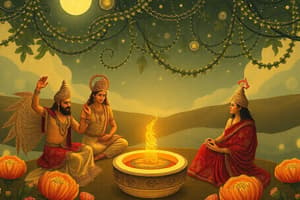Podcast
Questions and Answers
What does the prick of a thorn to our toe symbolize in the context of compassion?
What does the prick of a thorn to our toe symbolize in the context of compassion?
- The separation between self and others
- The nature of pain and suffering
- The response of physical injury to injury
- The inherent caring nature of individuals (correct)
What is the ultimate goal of Hinduism as described?
What is the ultimate goal of Hinduism as described?
- To experience the oneness with God and the universe (correct)
- To maintain strict adherence to rituals and traditions
- To attain social status and recognition
- To accumulate wealth and prosperity
Which path is NOT mentioned as a way to attain spiritual experience in Hinduism?
Which path is NOT mentioned as a way to attain spiritual experience in Hinduism?
- The path of meditation (raja yoga)
- The path of selfless action (karma yoga)
- The path of devotion (bhakti yoga)
- The path of philosophical debate (tarka yoga) (correct)
What does 'Sanatana Dharma' mean in the context of Hinduism?
What does 'Sanatana Dharma' mean in the context of Hinduism?
How does Hinduism view the concept of sectarianism?
How does Hinduism view the concept of sectarianism?
What is the significance of forgiving one's finger when it pokes the eye?
What is the significance of forgiving one's finger when it pokes the eye?
What is the relationship between consciousness and God as explained in Hinduism?
What is the relationship between consciousness and God as explained in Hinduism?
What is the approach of Hinduism towards the upliftment of all beings?
What is the approach of Hinduism towards the upliftment of all beings?
Flashcards are hidden until you start studying
Study Notes
Compassion and Oneness
- Compassion is an innate quality, evident when experiencing pain, reflecting an essential aspect of human nature.
- Just as heat signifies fire and fragrance denotes flowers, giving comfort to others emerges as a fundamental trait.
- The interconnectedness of the self is illustrated through the response to self-inflicted pain; we care for the part that is hurt, representing unity in experience.
Goals of Hinduism
- The ultimate aim of Hinduism is to cultivate the understanding that all beings are interconnected.
- Expansion of consciousness from a limited self to a universal perspective is necessary for realizing unity with the divine.
- Experiencing oneness with God leads to spiritual perfection.
Sanatana Dharma
- Hinduism is referred to as Sanatana Dharma, meaning "Eternal Principle," indicating its timeless relevance across cultures and eras.
- It emphasizes the search for eternal truths, focusing on the collective upliftment of humanity.
Paths to Spiritual Enlightenment
- Various paths are presented within Hinduism to achieve spiritual realization:
- Karma Yoga: The path of selfless action.
- Bhakti Yoga: The path of devotion and love towards God.
- Jnana Yoga: The path of wisdom and self-inquiry.
- Raja Yoga: The path of meditation and discipline.
- Each path offers a distinct approach but leads to the same understanding of unity with God.
Inclusivity in Hinduism
- Hinduism promotes an inclusive outlook, discouraging sectarianism and promoting broad-mindedness.
- The philosophy encourages the advancement and progress of all individuals, seeking to improve the world collectively.
Studying That Suits You
Use AI to generate personalized quizzes and flashcards to suit your learning preferences.





